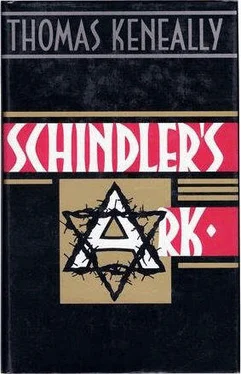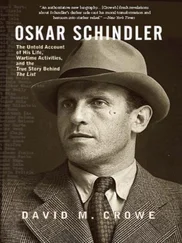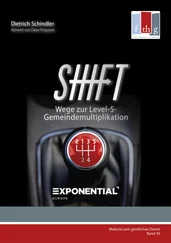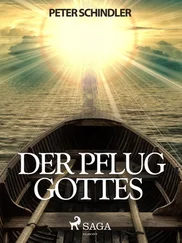The truth, however, was that the commandos had only to formalize the disarming described in Oskar’s speech. The guards at the main gate gave up their weapons almost gratefully. On the darkened steps leading up to the SS barracks, Poldek Pfefferberg and a prisoner named Jusek Horn disarmed Commandant Motzek, Pfefferberg putting his finger in the man’s back and Motzek, like any sane man over forty with a home to go to, begging them to spare him. Pfefferberg took the Commandant’s pistol, and Motzek, after a short detention during which he cried out for the Herr Direktor to save him, was released and began to walk home.
The towers, about which Uri and the other irregulars must have spent hours of speculation and scheming, were discovered abandoned. Some prisoners, newly armed with the garrison’s weapons, were put up there to indicate to anyone passing by that the old order still held sway here.
When midnight came, there were no SS men or women visible in the camp. Oskar called Bankier to the office and gave him the key to a particular storeroom. It was a naval supply store and had been situated, until the Russian offensive into Silesia, somewhere in the Katowice area. It must have existed to supply the crews of river and canal patrol boats, and Oskar had found out that the Armaments Inspectorate wanted to rent storage space for it in some less threatened area. Oskar got the storage contract—”with the help of some gifts,” he said later. And so eighteen trucks loaded with coat, uniform, and underwear fabric, with worsted yarn and wool, as well as with a half a million reels of thread and a range of shoes, had entered the Brinnlitz gate and been unloaded and stored. Stern and others would declare that Oskar knew the stores would remain with him at the end of the war and that he intended the material to provide a starting stake for his prisoners. In a later document, Oskar claims the same thing. He had sought the storage contract, he says, “with the intention of supplying my Jewish protégés at the end of the war with clothing…. Jewish textile experts estimated the value of my clothing store at more than $150,000 U.S. (peace currency).”
He had in Brinnlitz men capable of making such a judgment—Juda Dresner, for example, who had owned his own textile business in Stradom Street; Itzhak Stern, who had worked in a textile company across the road. For the rite of passing over this expensive key to Bankier, Oskar was dressed in prisoner’s stripes, as was his wife, Emilie. The reversal toward which he’d been working since the early days of DEF was visibly complete. When he appeared in the courtyard to say goodbye, everyone thought it a lightly put on disguise, which would be lightly taken off again once he encountered the Americans. The wearing of the coarse cloth was, however, an act that would never completely be laughed off. He would in a most thorough sense always remain a hostage to Brinnlitz and Emalia.
Eight prisoners had volunteered to travel with Oskar and Emilie. They were all very young, but they included a couple, Richard and Anka Rechen. The oldest was an engineer named Edek Reubinski, but he was still nearly ten years younger than the Schindlers. Later, he would supply the details of their eccentric journey.
Emilie, Oskar, and a driver were meant to occupy the Mercedes. The others would follow in a truck loaded with food and with cigarettes and liquor for barter. Oskar seemed anxious to be away. One arm of Russian threat, the Vlasovs, was gone. They had marched out in the past few days. But the other, it was presumed, would be in Brinnlitz by the next morning, or even sooner. From the back seat of the Mercedes, where Emilie and Oskar sat in their prison uniforms—not, it had to be admitted, much like prisoners; more like bourgeoisie off to a masquerade ball—Oskar still rumbled out advice for Stern, orders to Bankier and Salpeter. But you could tell he wanted to be off. Yet when the driver, Dolek Grünhaut, tried to start the Mercedes, the engine was dead. Oskar climbed out of the back seat to look under the hood. He was alarmed—a different man from the one who’d given the commanding speech a few hours before. “What is it?” he kept asking. But it was hard for Grünhaut to say in the shadows. It took him a little time to find the fault, for it was not one he expected. Someone, frightened by the idea of Oskar’s departure, had cut the wiring.
Pfefferberg, part of the crowd gathered to wave the Herr Direktor off, rushed to the welding shop, brought back his gear, and went to work. He was sweating and his hands seemed clumsy, for he was rattled by the urgency he could sense in Oskar. Schindler kept looking at the gate as if the Russians might at any second materialize. It was not an improbable fear— others in the courtyard were tormented by the same ironic possibility—and Pfefferberg worked too hard and took too long. But at last the engine caught to Grünhaut’s frantic turning of the key.
Once the engine turned over, the Mercedes left, the truck following it. Everyone was too unnerved to make formal goodbyes, but a letter, signed by Hilfstein and Stern and Salpeter, attesting to Oskar’s and Emilie’s record, was handed to the Schindlers. The Schindler convoy rolled out the gate and, at the road by the siding, turned left toward Havlíčkův Brod and toward what was for Oskar the safer end of Europe. There was something nuptial about it, for Oskar, who had come to Brinnlitz with so many women, was leaving with his wife. Stern and the others remained standing in the courtyard. After so many promises, they were their own people. The weight and uncertainty of that must now be borne.
The hiatus lasted three days and had its history and its dangers. Once the SS left, the only representative of the killing machine left in Brinnlitz was a German Kapo who had come from Gróss-Rosen with the Schindler men. He was a man with a murderous record in Gróss-Rosen itself, but one who had also made enemies in Brinnlitz. A pack of male prisoners now dragged him from his bunk down to the factory hall and enthusiastically and mercilessly hanged him from one of the same beams with which Untersturmführer Liepold had recently threatened the prison population. Some inmates tried to intervene, but the executioners were in a rage and could not be stopped. It was an event, this first homicide of the peace, which many Brinnlitz people would forever abhor. They had seen Amon hang poor engineer Krautwirt on the Appellplatz at Płaszów, and this hanging, though for different reasons, sickened them as profoundly. For Amon was Amon and beyond altering. But these hangmen were their brothers. When the Kapo ceased his twitching, he was left suspended above the silenced machines. He perplexed people, though. He was supposed to gladden them, but he threw doubt. At last some men who had not hanged him cut him down and incinerated him. It showed what an eccentric camp Brinnlitz was, that the only body fed into the furnaces which, by decree, should have been employed to burn the Jewish dead was the corpse of an Aryan. The distribution of the goods in the Navy store went on throughout the next day. Lengths of worsted material had to be cut from the great bolts of fabric. Moshe Bejski said that each prisoner was given three yards, together with a complete set of underwear and some reels of cotton. Some women began that very day to make the suits in which they would travel home. Others kept the fabric intact so that, traded, it would keep them alive in the confused days to come.
A ration of the Egipski cigarettes which Oskar had plundered from burning Brno was also issued, and each prisoner was given a bottle of vodka from Salpeter’s storehouse. Few would drink it.
It was, of course, simply too precious to drink.
After dark on that second night, a Panzer unit came down the road from the direction of Zwittau. Lutek Feigenbaum, behind a bush near the gate and armed with a rifle, had the urge to fire as soon as the first tank passed within sight of the camp. But he considered it rash. The vehicles rattled past. A gunner in one of the rear tanks in the column, understanding that the fence and the watchtowers meant that Jewish criminals might be lying low in there, swiveled his gun and sent two shells into the camp. One exploded in the courtyard, the other on the women’s balcony. It was a random exhibition of spite, and through wisdom or astonishment none of the armed prisoners answered it.
Читать дальше












